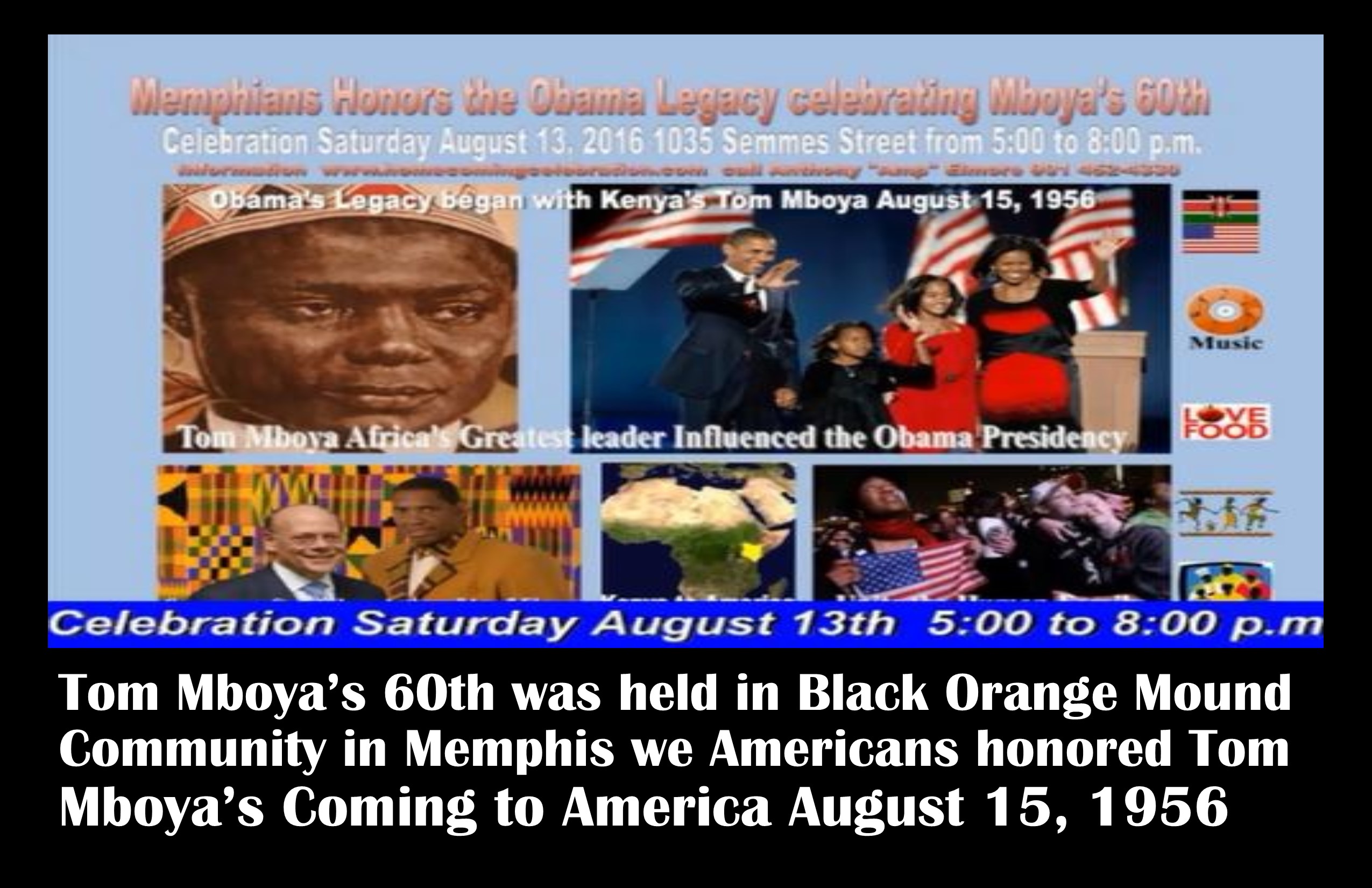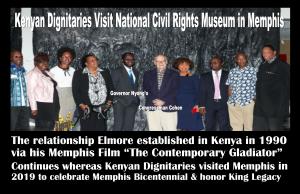Black Memphis History: Meet Tom Mboya The Greatest African to Influence American Culture, History & African Connection
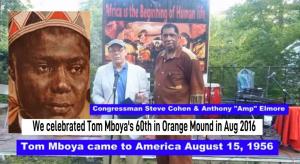
Memphis Congressman Steve Cohen At Elmore's Home in Orange Mound Celebrating Tom Mboya's 60th without an Mboya there would never have been an Obama Presidency
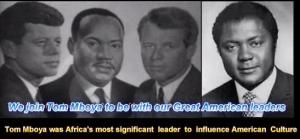
During the Civil Rights many Black Homes had the picture of John Kennedy, Robert Kenney and Dr. Martin Luther King if the Mboya Story was told Black America would have embraced Tom Mboya Amp Elmore is working to tell the Tom Mboya Story
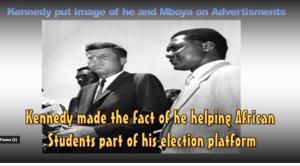
Presidential Candidate John F. Kennedy used this image of he in Tom Mboya on campaign advertisements Black changed for Republican to Democrats put Kennedy in Office
Black Memphis History: The Orange Mound to Africa Initiative Connects Kennedy, King, Kenya, Obama and the African and African/American Family Culture & History
You can explore the Orange Mound to Africa Initiative by visiting the website www.orangemoundtoafrica.com. This initiative connects Orange Mound, a historic Black community in Memphis—the first neighborhood built for Blacks by Blacks in America—with Africa, Kennedy, King, Kenya, and Obama.
The estimated distance between Memphis and Kenya is approximately 8,266 miles, highlighting the remarkable connection between Orange Mound and the African continent.
In 1990, the Black 1988 Memphis produced film The Contemporary Gladiator premiered in Nairobi, Kenya. The Kenyan government extended a hero’s welcome to film producer Anthony Elmore film star and cast members, sponsoring a luxurious safari. It was an incredible experience for Blacks men who had produced and associated with the film to be honored in Kenya.
Film producer Elmore notes "I vividly remember being in a safari tent, tears streaming down my face. I was part of the first generation of Africans returning to our ancestral homeland. An encounter with what an African described as ‘Ancestral Spirits’ profoundly touched me. From that moment, my life’s purpose became uniting Africans and African Americans and telling how wonderful an experience it is visiting Africa.
"In 1953, an organization called ACOA (American Committee on Africa) was formed in America. Its founders were George Houser, a White man who was also one of the founding member of C.O.R.E. or the Congress of Racial Equality, and Bayard Rustin, an African/America man. For history enthusiasts, on November 3, 2023, a film titled Rustin premiered in American movie theaters. Bayard Rustin one of the founders of ACOA is also , the organizer of the 1963 March on Washington, where Dr. Martin Luther King Jr. delivered the iconic I Have a Dream’ speech.
It was ACOA that sponsored 26-year-old Tom Mboya to come to America. Tom Mboya was unlike any African, Americans had seen before—handsome, educated, and articulate. His goal was to advocate for the freedom from colonization of his people in Africa. Hailing from ‘British East Africa,’that became Kenya in 1963 Mboya fought and spoke against colonization.
Through ACOA, Mboya embarked on speaking tours addressing the Kenya question. He could speak for hours without notes, urging colleges to grant scholarships to African students. Remarkably, while African Americans faced strict Jim Crow laws preventing them from attending White schools, African students were considered foreign and could attend White colleges. Tom Mboya played a pivotal role in integrating liberal White colleges in America with African students.
By 1959, Mboya had secured so many scholarships for African students that they needed to charter an airplane to bring them to America. To raise funds, Baseball Great Jackie Robinson, Actor Sidney Poitier, and Singer Harry Belafonte lent their names to a letter, launching the Mboya Airlift America plan.
Among the beneficiaries of this plan was the 23-year-old Kenya student who went to college in Hawaii on the Jackie Robinson Scholarship named Barack Obama Sr. the father of former American President Barack Obama Jr.
Tom Mboya emerged as the de facto African leader and spokesperson. He graced the covers of Jet and time magazines and received an honorary Doctorate Degree from prestigious Howard University in 1959.
On May 13, 1959, Tom Mboya was honored at an African Freedom dinner at Atlanta University. Dr. Martin Luther King, speaking at the dinner, reminded us: ‘Our struggle is not an isolated one; we are all caught in an inescapable network of mutuality.’"
In July 1960, the Airlift America program had gained so much popularity in the United States. An urgent need for support arose, prompting Tom Mboya to seek assistance from Presidential Candidate Richard Nixon. However, Nixon declined to help.
While in Kenya a crisis was happening . Airlift America had gained so many scholarship that another charter plane was needed to carry the Kenya students to America. There was no money for airfare to get the Kenyans to America. There was one last hope A meeting was arranged for Mboya meet with Senator John F. Kennedy, who was running as for the Democratic presidential nominee whose father had a lot of money. Mboya rushed to America to meet with Kennedy at On July 26, 1960, at the Kennedy Compound. Mboya emphasized to Kennedy the importance of education for Africans.
Senator Kennedy acknowledged the significance of education and initially agreed to provide $10,000. Later, he announced that the Kennedy Foundation would contribute $20,000. As the conversation continued, Kennedy committed not only $100,000 for transportation but also an additional $100,000 for expenses, with the condition that the donation remain anonymous.
Despite being a Democrat and part of the Southern White conservative Democrats, Kennedy’s support for African education did not favor well with the democratic party. His opponent Nixon alleged that he aimed to influence the Black vote via assisting African students. The event lead to a full blown investigation that Kenney was trying to buy Black votes. However, it was clear that Kennedy genuinely wanted to assist African students. Moreover Kennedy won the endorsement of singer Harry Belafonte.
Click here see 1960 add Harry Belafonte Campaigning for President Kennedy. Please note Blacks were Republican part of the Lincoln Party. Harry Belafonte was the most popular Black Singer in America at that time and it was historic for Blacks to support democrats. It was President John F. Kennedy who changed Blacks from Republican to democrat.
The 1960 presidential race between Kennedy and Nixon was extremely close, and the shift in Black voters from Republican to Democrat played a pivotal role. Richard Nixon was so concerned about this impact that he asked Tom Mboya to decline Kennedy’s financial support, suggesting that the State Department would fund Kenyan students instead. Unknown and untold it was Tom Mboya who influenced America's 1960 Presidential election.
The John F. Kennedy Presidential Library and Museum website reads: "At a key point in the 1960 presidential campaign, a dynamic young leader from Kenya named Tom Mboya visited Senator John F. Kennedy. Mboya led a campaign of his own that would eventually bring hundreds of African students to America for higher education, including Barack Obama Sr., President Obama's father. Kennedy's decision to support the effort became an issue in the election and possibly a factor in his narrow victory."
From 1960 until 1963 Tom Mboya with the help of future Black supreme court Justice Thurgood Marshall attended the Lancaster House Conferences took place in London for negotiations of Self-Rule" whereas Thurgood Marshall would draft Kenya's constitution for the new Independent nation that would be called Kenya.
Just 20, days before Kenya would become a nation John F. Kennedy would be assassinated on November 22, 1963. Kenya became an official nation December 12, 1963.
Click here Amp Video Kenya's Birth Part of American Civil Rights Movement. Elmore’s video titled “Birth of Kenya is part of the Civil Rights movement” sheds light on the story of Kenya. Kenya’s history, including figures like Tom Mboya, intersects with the broader civil rights movement. Elmore aims to produce a movie about Tom Mboya, a Kenyan politician and labor leader.
Elmore’s work bridges friendship, faith, finance, and food between Kenya, the United States, and the civil rights movement. Elmore’s Journey and Cultural Diplomacy. in Kenya, where Elmore received a hero’s welcome. His efforts to connect Africans and African Americans through heritage serve as a form of cultural diplomacy, fostering understanding, collaboration, and unity.
Anthony “Amp” Elmore’s work exemplifies how cultural connections can transcend borders and contribute to movements for equality and justice.
Click Here Kenyan Dignitaries Lead by Lupita Nyong'o Father Came to Memphis. Governor Nyongo hosting the FESTAC Festival in Kisumu, Kenya from August 25-t0-September 1, 2024. FESTAC is the World's largest Black and African Art, Culture and Trade Festival. Governor Nyong'o extended Anthony "Amp" A special invitation to attend and speak at the event. Elmore is inviting Congressman Cohen, Memphis Mayor Paul Young and Shelby County Elected officials to join him in Kenya.
Anthony Elmore is urging Governor Nyong’o to request Kenya President Dr. William Ruto’s support for establishing the “Kenya African/American Cultural Award.” This award would recognize African Americans who dedicate their lives to bridging the gap between Africans and African Americans.
In his film, Elmore shares a poignant scene where his father told him to cut his hair and stop identifying as African, even though he had never met an African. Elmore emphasizes that he made the first kickboxing film in world film history, inspiring Black children in Africa and around the world to believe they too can become kickboxing champions or filmmakers.
Elmore insists that President Dr. William Ruto could send a message to Black America. In a remarkable turn, a Black film produced in Memphis gained value in Kenya, where it was honored through a premiere. Elmore envisions African/American receiving a Presidential Award in Africa for their to connect African/Americans to their African heritage should be honored in Africa and brings Africans and African/Americans together.
Highlighting their 1988 film “The Contemporary Gladiator,” Elmore notes that it was the first independent 35mm film made in Memphis film history. Moreover, it may well be the first Black American film to premiere in an African country. This recognition would make African/Americans proud, and it demonstrates that Black work, often overlooked in America, can find appreciation in Africa.
Drawing parallels with the movie “Black Panther,” which features Kenyan actress Lupita Nyong’o, Elmore aims to position Memphis as Africa’s distribution center. We start relationships via culture whereas we can move from culture to trade and family.
Elmore believes that awarding the “Kenya African/American Cultural Award” encourages the dissemination of Kenyan culture. Elmore recorded Tom Mboya songs.
Elmore reminds Kenya President Dr. William Ruto that when he met the late Kenyan President Daniel Arap Moi, President Moi named him an African Ambassador whereas I promote Kenya so much I have picture of Kenya mounted on my home which is the 1st all African home in America.
Anthony Elmore
Orange Mound Black Memphis Hollywood
+1 901-452-4330
email us here
The Safari Initiative Foundation to build World's largest African and African/American Cultural Center in Kenya
Legal Disclaimer:
EIN Presswire provides this news content "as is" without warranty of any kind. We do not accept any responsibility or liability for the accuracy, content, images, videos, licenses, completeness, legality, or reliability of the information contained in this article. If you have any complaints or copyright issues related to this article, kindly contact the author above.

